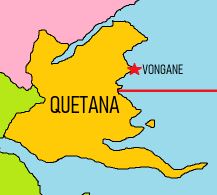Quetana: Difference between revisions
(Created page with "{{Infobox country |native_name = |conventional_long_name = Quetanan Republic |common_name = Quetana |image_flag = Queta...") |
No edit summary |
||
| Line 3: | Line 3: | ||
|conventional_long_name = Quetanan Republic | |conventional_long_name = Quetanan Republic | ||
|common_name = Quetana | |common_name = Quetana | ||
|image_flag = Quetanaflag. | |image_flag = Quetanaflag.jpg | ||
|alt_flag = Flag of Quetana | |alt_flag = Flag of Quetana | ||
|national_motto = | |national_motto = | ||
Revision as of 16:59, 29 March 2020
Quetanan Republic | |
|---|---|
|
Flag | |
 | |
| Capital | Vongane |
| Official languages | English, Spanish |
| Recognised national languages | Portuguese, French |
| Demonym(s) | Quetanan |
| Government | Unitary semi-presidential constitutional republic |
| António Brafeo | |
| José dos Reis | |
| Establishment | |
• Foundation | 868 |
• Parabocan Occupation | 1854 |
• Republic | 1910 |
| Population | |
• Estimate | 7,400,000 |
| Currency | Quentanan Lien |
| Date format | mm-dd-yyyy |
| Driving side | right |
Quetana, also known as the Quetanan Republic is a small nation in the International Democratic Union, located on a peninsula the coast of Catica's Olympic Ocean shore, bordering Rio Palito to the east. Quetana is one of the oldest nations in Catica and the world, its territory having been continuously settled, invaded and fought over since prehistoric times. Founded in 868, the County of Quetana gained prominence after the Battle of São Warena (1128). The Kingdom of Quetana was later proclaimed following the Battle of Terrace (1139) and the Treaty of Zamora in 1143.
In the 15th and 16th centuries, Quetana established one of the first global empires, becoming one of the world's major economic, political and military powers. During this period, Quetanan explorers pioneered maritime exploration, notably under royal patronage with such notable voyages as Almirian Gamor sailing beyond the Strait of Vulkaria (1482), Oscar Ferando's discovery of the sea route to Laeral and Libertas Omnium Maximus (1494–96) and the Catican discovery of Bears Armed (1500). During this time Quentana attemped to monopolize the spice trade and divided the world into hemispheres of dominion. However, events such as the 1724 Vongane earthquake, the independence of Zamastan (1802), the country's occupation before and during the Parabocan War, and a late industrialization compared to other Catican and Hespian powers erased to a great extent Quetana's prior opulence.
After the 1910 revolution deposed the monarchy, the democratic but unstable Quetanan Republic was established.
Quetana has left a profound cultural, architectural and linguistic influence across the globe, specifically Central Catica, with a legacy of around 250 million Quetanan-based speakers and creoles. It is a developed country with an advanced economy and high living standards. Additionally, it is highly placed in rankings of moral freedom, peacefulness, LGBTI rights, democracy, press freedom, stability, social progress, prosperity, and HDI.
